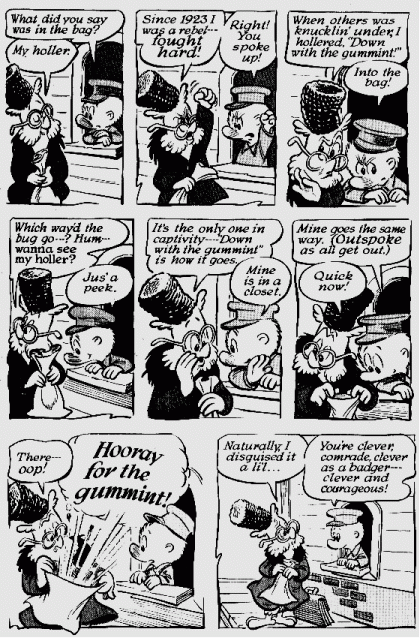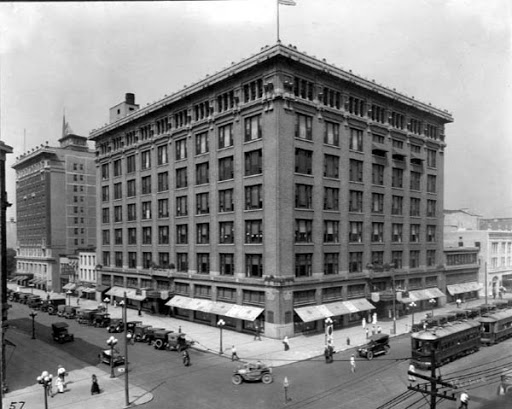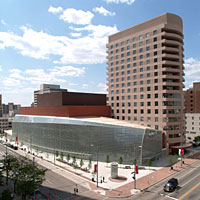Tulsa Vision 2025: June 2008 Archives
I very nearly turned my column this week into a sociological study of the denizens of Tulsa's Money Belt and how their behavior is shaped by peer pressure and fear of ostracism. In connection with the Great Plains Airlines bailout, I was thinking about a friend who asked me if my life insurance was paid up and another friend who told me a qui tam taxpayers' demand would never succeed in a Tulsa County courtroom, because no judge would dare cross the powerful entities who were pushing for the City's taxpayers to pay $7.1 million that it did not owe.
I was also thinking of the many times someone would tell me how they opposed this or that initiative or would confirm some speculation of mine about skulduggery in local government. He would be happy to tell me all this privately, but wouldn't dare go on the record: "I have to make a living in this town."
It brought to mind a story by cartoonist Walt Kelly. In 1955, Kelly published the seventh collection of his strip Pogo and the third book which consisted of entirely new material. The Pogo Peek-A-Book included a story called "The Man from Suffern on the Steppes or 1984 and All That: A Russian Tale of Madisonav." In one comic story, Kelly managed to spoof suburban commuters, Madison Avenue, and the Soviet Union.
In the run-up to the Vision 2025 vote, I emailed a series of panels from the story to a fellow TulsaNow board member. I was frustrated by the reluctance of some TulsaNow board members to say publicly what they were saying privately about the flaws in the package that the County Commissioners were putting before the voters. About a draft statement from the board, I wrote, in a July 12, 2003, email:
I have a lengthy comment, in a separate message, about the second draft, but for now, I will let Pogo and Howland Owl speak on my behalf. This is from the Pogo Peek-a-Book (1955), from a story called "The Man from Suffern on the Steppes", about ad men in the USSR. The ad exec (Howland) is having a subversive conversation with the train stationmaster.Translator's note -- "gummint" == "government"
Lately, a lot of things remind me of one Pogo comic strip or another.
Here is the excerpt:

The next day I sent the following email to the TulsaNow board:
NOTE: I wrote this last night, but network problems prevented sending it until now. Please forgive the length. Indirectly, it addresses some of what Jamie said in his recent message. This morning I had breakfast with someone I was meeting for the first time -- young, energetic, deeply engaged in the community, although a fairly recent arrival -- who, unprompted by me, made very similar observations.I continue to prefer L___'s original draft, enhanced by specific enumeration of our principles. R___ and W___'s version reads too much like a "vote yes" pamphlet, even if that wasn't intended. Below (far below) is my attempt at a rewrite, which attempts to express the concerns that were voiced without taking sides. I think we ought to explicitly say that we are choosing not to endorse or oppose, rather than allowing people to read in what they like. I also think we should be explicit and honest about the problems we have with the process and its product.
To use the terms of the Pogo cartoon I sent earlier, let's speak our criticisms openly and plainly, not into a bag and disguised as praise. We don't live in the old USSR. We shouldn't be afraid to utter mild criticisms of Tulsa's politburo and nomenklatura. And yet fear is precisely what I detect beneath the surface: Fear of ostracism, fear of exclusion, fear of economic consequences.
This may be a bit impolite to say, but it's there beneath the surface and ought to be dealt with openly. Some of our group work for organizations which are funded by supporters of this package. Others aren't personally dependent, but are involved with organizations that need the funds that the package supporters can offer. Others need the goodwill of city government to conduct business and make a living. Some of us have even been paid to facilitate and promote the vision process and to work for the "vote yes" campaign. Beyond the financial considerations, many members of our group move within a narrow circle of social and organizational connections -- a virtual "small town" within the city, focused on the arts and other non-profit organizations, centered around Utica Square and chronicled by Tulsa People and Danna Sue Walker. As in any small town, some opinions are acceptable and some are not, and speaking your mind risks ostracism.
To those of you who fall in one of these categories (which is very nearly all of us): You have made a valuable contribution to TulsaNow and to the dialog thus far. I don't wish to discount your input regarding this statement, I don't doubt your sincerity, and I appreciate the desire to "make lemonade out of lemons," as J___ put it. But I know how this town works, and you may be feeling the pressure right now to make certain people happy. I ask you to consider that your situation may be leading you to swallow your disappointment and smile for the cameras, rather than speaking openly about both the pros and cons of this package.
The people pushing this package, particularly the sports arena, are bullies. They want what they want, and because they have money and power, they think they have a right to bulldoze anyone who stands in the way. (Why they don't use all that money to build an arena themselves, rather than taxing the food, medicine, and electricity of the working class for it, is an interesting question.) After the 1997 election, an opposition leader was fired from his job with a downtown company, solely because of his opposition. In 2000, the bullies used implicit and explicit threats to silence opposition to "Tulsa Time" and to shut off public debate. Although I am (I thank God) not dependent on local moguls for my income, as an opposition spokesman, I felt the effects as well -- They tried to sway me with a board appointment, there was an attempt to undermine the Midtown Coalition, and they got their revenge on Election Day 2002. (That wasn't just about "Tulsa Time"; it was also because of my support for a meaningful neighborhood role in planning and zoning, something else the bullies don't want. )
The bullying has already begun for 2003. The bullies threatened the Mayor that they would withhold "vote yes" campaign funds if the arena was excluded or made to stand alone on the ballot. They have sent subtly threatening letters to both the Democratic and Republican Party chairmen. Elected officials who opposed the package were afraid to vote their conscience, afraid to speak, afraid to stand alone. Elected officials, holding the power we have granted them, talked of their decision as if they were helpless victims. A university president told me he would have liked to split his project off from the arena, but he wasn't in a position to speak out. Citizens expressing legitimate concerns are labelled "grumps" and "whiners" by the monopoly daily newspaper. The bullies are sending signals that anyone who fails to endorse the package can have no role in deciding how the money will be spent, should it pass (even though it's public money). The image they wish to project is that no respectable person would say a word against this package, much less vote against it. It appears that they will again try to cut off debate -- the Mayor has already backed out of a scheduled joint appearance on OETA with me.
As important as walkable neighborhoods and lively urban centers are -- and I do believe they matter -- I don't believe our city can flourish until we are capable of having a mature public conversation about such an important issue, without threats and arm-twisting. As long as the bullies run the show, we will not have grassroots-based planning; we will not have land use policies that encourage walkable neighborhoods and enlightened development; we will not have a workable historic preservation system; we will not progress in any way, if it means that the bullies must yield control. As long as the bullies are in charge, every vision process will end the same way -- whatever the structure, whatever the process, they control the final decision.
How can we advance the dialog about our city's future, if we are afraid to speak freely?
How many visionary civic and business leaders, with bold ideas for Tulsa's future, have been beaten down and have given up? How many have been co-opted? How many have decided to take their energy and vision to a city where it will be nurtured and appreciated? Perhaps this is why Tulsa is in the doldrums and doesn't seem to be moving forward. These bullies won't lead, don't have any visionary ideas and don't want any, but they refuse to yield the levers of power. Perhaps the most important thing we can do for our city is to throw off this oppressive pall.
Giving a bully what he wants only encourages him. The only way to stop a bully is to stand up to him. Not violent confrontation, but a refusal to back down, to give in. It can be as simple as saying no: "No, I will not be mean to Susie just so I can be your friend." "No, I will not give you my lunch money." "No, I will not move to the back of the bus." "No, the emperor is not wearing a beautiful new suit of clothes." "No" is a powerful word, and it becomes more powerful as more people speak it together. It can stop a bully in his tracks.
Some of us have observed that Tulsa's power structure is teetering on the edge of collapse. The Chamber is falling apart. Once dominant companies have fallen on hard times. Perhaps a little resistance will be enough to demolish the whole rotten structure. I don't know that I care so much whether this tax wins or loses, but I want to see Tulsans stand up to the bullies and break their stranglehold on progress.
I'm not asking you to come out and oppose this package, unless you want to. I'm simply asking you to say publicly what you think about it, pro and con. If you think the process stunk to high heaven, but you still plan to vote for the package -- fine, but be willing to say both things. Don't spin it to appease the bullies. The city body politic isn't a draft horse, to be fitted with blinders and a bit, and steered to a destination. Tulsans should be treated like free men and women, grown-up enough to weigh pros and cons and come to a decision.
I'm also asking us, collectively, as TulsaNow, to call the bullies' bluff. Say what you think people need to hear. Insist on public, frequent, and fair debates. Expose underhanded pressure tactics. If you're told to shun people who take a different viewpoint, refuse. If you're threatened with ostracism, or worse, go public. Insist on treating everyone involved in the debate with respect. If we stick together and do this, it would represent a real step toward maturity as a region.
Michael Bates
This week in Urban Tulsa Weekly, I wrote about a tour I was given a few weeks ago of Tulsa's BOk Center arena, scheduled to open this fall. Far from winning me over, the tour convinced me that by foregoing the "iconic" approach to architecture we could have had, for an amount closer to the original budget, an arena that would make a positive addition to downtown's urban fabric.
In the column, I mentioned another Cesar Pelli public facility with a curved, "iconic" glass wall. That's the Benjamin and Marian Schuster Performing Arts Center in Dayton, Ohio. The Schuster Center opened in 2003; construction began in 2000. The Rike Building, a handsome seven-story Sullivanesque department store built in 1911, was demolished to make way for the Schuster Center. Before:
After, from about the same angle:
You can see the transformation from good urban form which works well at a distance and up-close at pedestrian scale to a building that is somewhat interesting at a distance but monotonous up close. You would have been able to peek in the display windows of Rike's; the reflective glass on the Schuster Center won't let you see inside.
If you want to take a virtual Google Street View stroll past the Schuster Center, as I suggest in my column, start here and head west on W 2nd St.
There's a nice story on KOTV.com about Michael Sager's 1st Street Lofts, scheduled to be ready for occupancy this fall. Michael gave me a tour during the Blue Dome Arts Festival, and I wrote about some of the interesting ways he is adapting this old building; KOTV's Steve Berg reports on many of the same features, which you can see by clicking the video link at that story.

